Wikipedia:Picture of the day/March 2006
|
Featured picture tools: |
These featured pictures, as scheduled below, appeared as the picture of the day (POTD) on the English Wikipedia's Main Page in March 2006.
You can add an automatically updating POTD template to your user page using {{Pic of the day}} (version with blurb) or {{POTD}} (version without blurb). For instructions on how to make custom POTD layouts, see Wikipedia:Picture of the day.
March 1 - Wed

|
The Wolf spider is a spider of the family Lycosidae. Except for the genus Sosippus, these spiders do not use their silk to make a snare. Some use their silk to line a tubular tunnel in the ground. Some take regular shelter in natural crevices. Still others spend their entire lives wandering around with no fixed abode. Unlike many other spiders, they have good vision and run their prey down. Photo credit: Fir0002 |
Text version ( view - - talk - history ) — Condensed version ( view - )
Column version ( view - ) — Row version ( view - )
March 2 - Thu
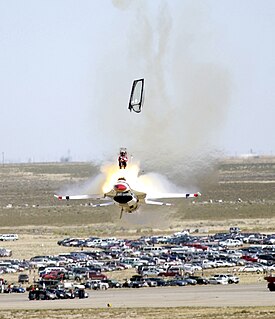
|
The first aircraft ejector seats were developed during WWII by Heinkel. The first test was with the Heinkel He 280 prototype jet fighter, and one of its test pilots, Helmut Schenk, was the first person to eject from a stricken aircraft on January 13 1942. By December 2003, Martin-Baker ejector seats had saved 7028 lives. The total figure for all types is unknown but must be considerably higher. This photo shows USAF Capt. Christopher Stricklin ejecting from an F-16 a second before it crashed on September 14 2003; Stricklin was not seriously injured. Photo credit: U.S. Air Force |
Text version ( view - - talk - history ) — Condensed version ( view - )
Column version ( view - ) — Row version ( view - )
March 3 - Fri
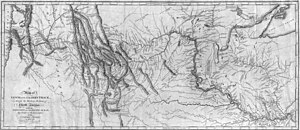
|
The Lewis and Clark Expedition (1804–1806) was the first United States overland expedition to the Pacific coast and back, led by Captain Meriwether Lewis and Second Lieutenant William Clark, of the US Army. Photo credit: Lewis, Meriwether; Clark, William |
Text version ( view - - talk - history ) — Condensed version ( view - )
Column version ( view - ) — Row version ( view - )
March 4 - Sat
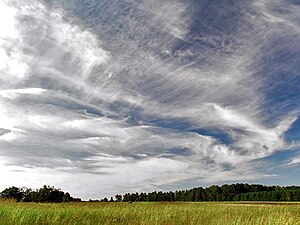
|
Cirrus clouds are composed of ice crystals and appear as hairlike filaments. They are formed at altitudes above 5000 metres (16,500 feet). The streaks are made of snowflakes that are falling from the cloud and being caught by the high level winds. The streaks point in the direction of the wind and may appear straight giving the clouds the appearance of a comma (cirrus uncinus), or may seem tangled, an indication of high level turbulence. Photo credit: Piccolo Namek |
Text version ( view - - talk - history ) — Condensed version ( view - )
Column version ( view - ) — Row version ( view - )
Mainpage version ( view - )
March 5 - Sun

|
The lemon, Citrus × limon, is a citrus tree, a hybrid of cultivated origin. The fruit are cultivated primarily for their juice, though the pulp and rind (zest) are also used, primarily in cooking or mixing. Lemon juice is about 5% citric acid, which gives lemons a sour taste; its pH is 2.3, so because of its acidity, lemon juice is commonly used in chemistry experiments. Photo credit: Jon Sullivan of PD Photo.org |
Text version ( view - - talk - history ) — Condensed version ( view - )
Column version ( view - ) — Row version ( view - )
Mainpage version ( view - )
March 6 - Mon

|
The Vitruvian Man is a famous drawing with accompanying notes by Leonardo da Vinci made around the year 1490 in one of his journals. It depicts a naked male figure in two superimposed positions with his arms apart and simultaneously inscribed in a circle and square. The drawing and text are sometimes called the Canon of Proportions. The rediscovery of the mathematical proportions of the human body in the 15th century by Da Vinci and others is considered one of the great achievements leading to the Italian Renaissance. Artist: Leonardo da Vinci |
Text version ( view - - talk - history ) — Condensed version ( view - )
Column version ( view - ) — Row version ( view - )
March 7 - Tue

|
Jakarta suffers from major urbanization problems. The population has risen sharply from 2.7 million in 1960 to 8.3 million in 2000. The rapid population growth has outgrown the government's ability to provide basic needs. A slum is an overcrowded and squalid district of a city or town usually inhabited by the very poor. Due to poverty and unemployment, slums are breeding centers for many social problems such as crime, drug addiction, alcoholism, and despair. Picture credit: Jonathan McIntosh |
Text version ( view - - talk - history ) — Condensed version ( view - )
Column version ( view - ) — Row version ( view - )
March 8 - Wed

|
The airship USS Akron (ZRS-4) flying over the southern tip of Manhattan circa 1931–1933. The Akron was a commissioned 'ship' of the United States Navy, built for them by the Goodyear-Zeppelin Corporation in Akron, Ohio. She cast off for her maiden voyage on 2 November 1931, but crashed less than two years later. Photo credit: U.S. Naval Historical Center |
Text version ( view - - talk - history ) — Condensed version ( view - )
Column version ( view - ) — Row version ( view - )
March 9 - Thu

|
The orb-weaver spiders (family Araneidae) are the familiar builders of spiral wheel-shaped webs often found in gardens, fields and forests. The family is a large one, including over 2800 species in over 160 genera worldwide, making it the third largest known (behind Salticidae and Linyphiidae). The web has always been thought of as an engineering marvel. Photo credit: Piccolo Namek |
Text version ( view - - talk - history ) — Condensed version ( view - )
Column version ( view - ) — Row version ( view - )
March 10 - Fri

|
A plant's leaves are the primary sites for photosynthesis. The green colour is from chlorophyll, a pigment that absorbs the energy from sunlight falling on the leaf. The veins are the vascular tissue of the leaf, moving water into the leaf and the sap produced by photosynthesis back out. Photo credit: PDPhoto.org |
Text version ( view - - talk - history ) — Condensed version ( view - )
Column version ( view - ) — Row version ( view - )
March 11 - Sat

|
Firedancing (also known as "fire twirling," "fire spinning," or "fire manipulation") is a group of circus-art disciplines that involve manipulation of objects on fire. Typically these objects have one or more bundles of wicking, which are soaked in fuel and lit. Some of these disciplines are related to juggling, and there is also an affinity between firedancing and rhythmic gymnastics. Firedancing is often performed to music. Photo credit: Haloeffect |
Text version ( view - - talk - history ) — Condensed version ( view - )
Column version ( view - ) — Row version ( view - )
Mainpge version ( view - )
March 12 - Sun

|
The Tuamotus are the largest chain of atolls in the world, spanning an area of the Pacific Ocean roughly the size of Western Europe. Despite the vast spread of the archipelago, the combined land area is only about 885 km² (345 sq. mi.). The climate is warm tropical, without pronounced seasons and a relatively continuous average temperature of 26°C (79°F). Water sources such as lakes or rivers are absent, leaving the only source of fresh water as catchments of rain water. Photo credit: Frédéric Jacquot |
Text version ( view - - talk - history ) — Condensed version ( view - )
Column version ( view - ) — Row version ( view - )
Mainpge version ( view - )
March 13 - Mon

|
An 18th Century Persian astrolabe - maker unknown. The points of the curved spikes on the front rete plate mark the positions of the brightest stars. The name of each star is labeled at the base of each spike. The back plate, or mater, is engraved with projected coordinate lines. From the Whipple Museum of the History of Science in Cambridge. Photo credit: Solipsist |
Text version ( view - - talk - history ) — Condensed version ( view - )
Column version ( view - ) — Row version ( view - )
March 14 - Tue

|
A butterfly is a flying insect. When touched by humans, they tend to lose some scales, that look like a fine powder. If they lose too many scales, their ability to fly will be impaired. People who study or collect butterflies (or the closely related moths) are called lepidopterists. Photo credit: William M. Connolley |
Text version ( view - - talk - history ) — Condensed version ( view - )
Column version ( view - ) — Row version ( view - )
March 15 - Wed
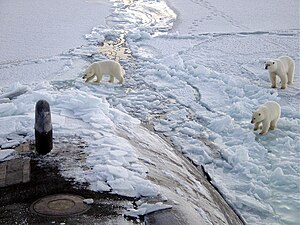
|
Three Polar bears approach the starboard bow of the Los Angeles-class fast attack submarine USS Honolulu (SSN 718) while surfaced 280 miles from the North Pole. Sighted by a lookout from the bridge (sail) of the submarine, the bears investigated the boat for almost 2 hours before leaving. USS Honolulu is the 24th Los Angeles-class submarine, and the first original design in her class to visit the North Pole region. Photo credit: Chief Yeoman Alphonso Braggs U.S. Navy |
Text version ( view - - talk - history ) — Condensed version ( view - )
Column version ( view - ) — Row version ( view - )
March 16 - Thu

|
Plasma lamps (also called plasma globes, plasma balls, plasma domes, plasma spheres, or plasma orbs) are novelty items which were most popular in the 1980s. The technology used in the plasma sphere, high frequency currents in an evacuated glass tube, was invented by the artist Bill Parker, while an undergraduate student at MIT. Later he developed it into the now ubiquitous product while he was an Artist in Residence at the Exploratorium science museum. Photo credit: Luc Viatour |
Text version ( view - - talk - history ) — Condensed version ( view - )
Column version ( view - ) — Row version ( view - )
March 17 - Fri

|
The Moscow Metro is the world's most heavily used metro system. Kievskaya station is one of the oldest stations on the network and lies on the Kol'tsevaya line (the central ring line) which was completed in 1937. Several of the central stations are remarkable for their ornate architecture, with marble columns, granite floors and chandeliers. Kievskaya station is particularly noted for its wall mosaics which depict socialist realist scenes from the history of the Ukraine. Photo credit: Worldtraveller |
Text version ( view - - talk - history ) — Condensed version ( view - )
Column version ( view - ) — Row version ( view - )
March 18 - Sat

|
The First Transcontinental Railroad in the United States was built across North America in the 1860s, linking the railway network of the eastern U.S. with California on the Pacific coast. Finished on May 10, 1869 at the famous Golden spike event at Promontory Summit, Utah, it created a nationwide mechanized transportation network that revolutionized the population and economy of the American West, catalyzing the transition from the wagon trains of previous decades to a modern transportation system. Photo credit: Archive - Nominate new image |
Text version ( view - - talk - history ) — Condensed version ( view - )
Column version ( view - ) — Row version ( view - )
Mainpage version ( view - )
March 19 - Sun

|
A cocktail is a mixed drink, usually containing one or more distilled alcoholic beverages and in addition sometimes containing non-alcoholic drinks, ice and sometimes liqueur, fruit, sauce, honey, milk or cream, or spices. The cocktail became popular during Prohibition in the United States; to mask the taste of bootlegged alcohol, the bartenders at a speakeasy would mix it with other liquors and non-alcoholic drinks. Photo credit: Nik Frey |
Text version ( view - - talk - history ) — Condensed version ( view - )
Column version ( view - ) — Row version ( view - )
Mainpage version ( view - )
March 20 - Mon

|
A portrait of Wernher von Braun standing in front of the cluster of F-1 rocket engines on the base of the first stage of a Saturn V launch vehicle. Von Braun had a lifelong aspiration to fly to the moon. A pioneer of rocket development, in the Second World War von Braun led the German development of the V-2 rocket at Peenemünde. Along with his team of engineers, he surrendered to the American forces in the closing stages of the war, then helped to establish the military rocket program in the United States. In 1958 he transferred to the newly established NASA program, developing the Saturn V rocket that successfully delivered a man to the moon in 1969. Photo credit: NASA |
Text version ( view - - talk - history ) — Condensed version ( view - )
Column version ( view - ) — Row version ( view - )
March 21 - Tue

|
The Intel 80486DX2 is a CPU produced by Intel that was introduced in 1992. The 80486DX2 is identical to a 80486DX but for the addition of "clock doubling" technology. It was the first chip to use clock doubling, whereby the processor performs two clock cycles per single cycle of the memory bus. Essentially, the processor's speed is set to double of the speed of the system bus. Because of this, an Intel 80486DX2 is faster than an Intel 80486DX-based system at the same processor speed. Chart created by: uberpenguin |
Text version ( view - - talk - history ) — Condensed version ( view - )
Column version ( view - ) — Row version ( view - )
March 22 - Wed
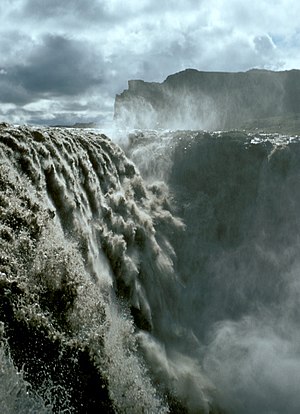
|
The Dettifoss is a waterfall located in the Mývatn area of North Central Iceland. It is situated in the Jökulsá á Fjöllum river which flows from glaciers. It is reputed to be the most powerful waterfall in Europe having a flow variously estimated at between 200 and 500 cubic metres of water per second depending on the season and the summer ice melt. The falls are 100 m wide with a drop of 44 m. Photo credit: Roger McLassus |
Text version ( view - - talk - history ) — Condensed version ( view - )
Column version ( view - ) — Row version ( view - )
March 23 - Thu

|
A tram (tramcar, trolley, streetcar, or street railway) is a railborne vehicle, lighter than a train, designed for the transport of passengers (and/or, very occasionally, freight) within, close to, or between villages, towns and/or cities. Trams are distinguished from other forms of rail-bourne vehicles in that they travel wholly or partly along tracks laid down in streets, usually on track reserved for the tram system. A cable car is a special type of tram. The car shown here is one of the oldest currently in use on Vienna, Austria's tracks. Photo credit: KF |
Text version ( view - - talk - history ) — Condensed version ( view - )
Column version ( view - ) — Row version ( view - )
March 24 - Fri

|
The Coyote is a wild member of the dog family found in North America. Being intelligent and highly adaptable, the coyote is one of only a few larger animals who have been able to increase their territory in the face of human encroachment, despite being actively hunted. In the mythology of Native American peoples, the coyote plays a similar role to that of the fox in Europe and Japan — that of being a cunning and wily trickster. Photo credit: vxdigital |
Text version ( view - - talk - history ) — Condensed version ( view - )
Column version ( view - ) — Row version ( view - )
March 25 - Sat

|
Hashish (often shortened to hash, and also referred to by countless slang terms such as chocolate) is a psychoactive drug derived from the Cannabis sativa plant. It is solid, of varying hardness and pliability, softening under heat. Its colour can vary from reddish brown to black, and can also be greenish or golden. It is usually smoked in pipes, and sometimes in joints mixed with tobacco or Cannabis buds. It can also be added to cookies or other food and ingested. Hash is used for its relaxing and mind-altering effects. Many people have claimed that using it gives them great insights. Photo credit: Roger McLassus |
Text version ( view - - talk - history ) — Condensed version ( view - )
Column version ( view - ) — Row version ( view - )
March 26 - Sun

|
The Asian Arowana (Scleropages formosus), also called the Asian Bonytongue, is a species of freshwater bony fish from Southeast Asia. Its four varieties are native to the rivers of Southeast Asia and Indonesia. The Asian Arowana has a long body; large pectoral fins; dorsal and anal fins located far back on the body; and a much larger caudal fin than that of its relative, the Silver arowana. Its scales are large and usually metallic colored, and it has paired barbels on the end of the lower jaw. It is a mouthbrooder. It is sometimes called Dragon Fish by fish enthusiasts because of its resemblance to the mythical Chinese dragon. Photo credit: Cele4 |
Text version ( view - - talk - history ) — Condensed version ( view - )
Column version ( view - ) — Row version ( view - )
March 27 - Mon

|
The Australian Garden Orb Weaver is one of the more common species of spider in Australia. Like other orb weaver spiders, they use a vertical wheel shaped web to trap flying insects. However the Garden Orb Weaver is a nocturnal hunter and spins a fresh web each evening, taking it down again in the morning. The spider waits for prey hanging head down in the centre of the web. Photo credit: Fir0002 |
Text version ( view - - talk - history ) — Condensed version ( view - )
Column version ( view - ) — Row version ( view - )
March 28 - Tue

|
The Koala (Phascolarctos cinereus) is a thickset arboreal marsupial herbivore native to Australia, and the only extant representative of the family, Phascolarctidae. Koalas are found all along the eastern coast of Australia from near Adelaide to the base of the Cape York Peninsula, and as far into the hinterland as there is enough rainfall to support suitable forests. The Koalas of South Australia were exterminated during the early part of the 20th century, but the state has since been repopulated with Victorian stock. Photo credit: Diliff |
Text version ( view - - talk - history ) — Condensed version ( view - )
Column version ( view - ) — Row version ( view - )
March 29 - Wed

|
Kiritimati is a Pacific atoll re-discovered by Captain James Cook on 24 December 1777, which explains its alternative name of Christmas Island. It has the largest land area of any coral atoll and is also the oldest surviving atoll. Between 1956 and 1962 the island was used by the United Kingdom and United States governments as a base for nuclear tests. Today the island is part of the Republic of Kiribati. Photo credit: Crew of Mission 4, ISS, NASA |
Text version ( view - - talk - history ) — Condensed version ( view - )
Column version ( view - ) — Row version ( view - )
March 30 - Thu

| |
| A rainforest is a forested biome with high annual rainfall. Tropical rainforests arise due to the Intertropical Convergence Zone, but temperate rainforests also exist. As well as prodigious rainfall, many rainforests are characterized by a high number of resident species and tremendous biodiversity.
Botanical gardens grow a wide variety of plants primarily categorized and documented for scientific purposes, but also for the enjoyment and education of visitors, a consideration that has become essential to secure public funding. Photo credit: Fir0002 | |
Text version ( view - - talk - history ) — Condensed version ( view - )
Column version ( view - ) — Row version ( view - )
March 31 - Fri
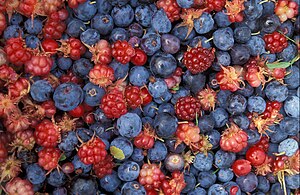
|
A selection of Alaskan wild berries from Innoko National Wildlife Refuge. This selection of woodland berries, including raspberries and blueberries are actually false berries. The common use of the word berry, simply refers to any small, sweet, fleshy fruit. The botanical use of the word is based on which part of the plant's ovary develop into the fruit. Photo credit: United States Fish and Wildlife Service |
Text version ( view - - talk - history ) — Condensed version ( view - )
Column version ( view - ) — Row version ( view - )
Picture of the day archives and future dates
